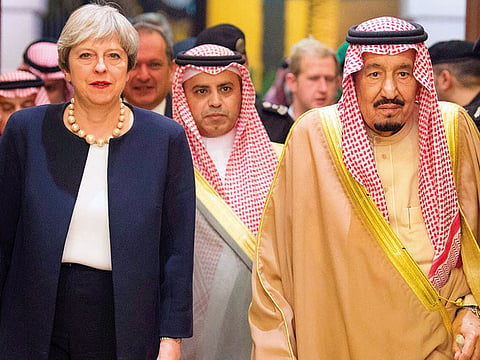British PM: We share Saudi concerns over Iran’s regional behavior
King Salman agrees to clear flow of commercial supplies to Yemen to avert famine

Riyadh: British Prime Minister Theresa May has discussed Iran’s destabilising behaviour in the region during a visit to Riyadh yesterday where she met King Salman Bin Abdul Aziz and Crown Prince Mohammad Bin Salman.
“The prime minister noted that we shared Saudi Arabia’s concerns about Iran’s destabilising regional behaviour,” her office said.
Saudi Arabia accuses Iran of smuggling in weapons for Al Houthi militants. Last month a ballistic missile fired by the militants targeted Riyadh but was intercepted. Saudi Arabia called the attack ‘an act of war’.
Saudi Arabia is Britain’s largest trading partner in the Middle East, and London has signed off on more than $3.3 billion (Dh12.11 billion) worth of arms sales to Riyadh since March 2015.
May also discussed the humanitarian situation in Yemen during her visit.
A Saudi-led coalition fighting to restore the internationally-recognised government in Yemen has partially lifted restrictions on bringing in aid to Yemeni ports.
Matter of urgency
“The king made clear that the flow of commercial supplies on which the country (Yemen) depends must be resumed if we are to avert a humanitarian catastrophe,” May’s office said.
“They agreed that steps needed to be taken as a matter of urgency to address this.”
Saudi Arabia is Britain’s largest trading partner in the Middle East, and London has signed off on more than $3.3 billion (Dh12.11 billion) worth of arms sales to Riyadh since March 2015.
That was the month that Riyadh launched its intervention against the Iran-backed Al Houthi rebels who took over the government in a coup in late 2014. While the Saudi-led coalition has helped Yemeni forces gain control of 85 per cent of the country, the rebels still are in control of main population centres.
The war has since killed around 8,600 people, while a further 2,000 have died of cholera.
The Yemeni government blames Al Houthis on the horrific humanitarian situation in the country and say they constantly hijack international aid to fund their war campaign.
UN officials say Yemen could face the world’s largest famine in decades if the situation continues.
Visit to Jordan
May left later for Jordan, a close British ally and partner in the US-led coalition fighting Daesh in Iraq and Syria.
She will meet with King Abdullah and Prime Minister Hani Mulki on the final leg of her tour.
Jordan is seen by the UK as a vital bulwark in the region, but it is struggling with the impact of many thousands of Syrian refugees as well as high youth unemployment in a country where half the population is aged 24 or less.
May is expected to announce efforts to help the Jordanian economy in the longer term, including £60 million in new grants, especially connected to education. She will also stress that peace in Syria can only realistically happen without Bashar Al Assad in charge.
Before her Riyadh trip, May made a surprise visit to Baghdad on Wednesday, where she met with Iraqi prime minister, Haider Al Abadi, about the recapture of Mosul from Daesh fighters, also meeting UK troops who had trained Iraqi forces who took part in the battle.
May highlighted the threat posed by dispersing Daesh fighters, some of whom have massed near the north of Jordan.
There is also the risk of more returning to Britain — government figures estimate that around 850 UK-linked people of national security concern have travelled to the region to fight, with just under half having returned so far.
Al Abadi asked for more direct security assistance in the region, also including training for Iraqi forces to clear Mosul and Raqqa of explosive devices left by Daesh as it fled.



